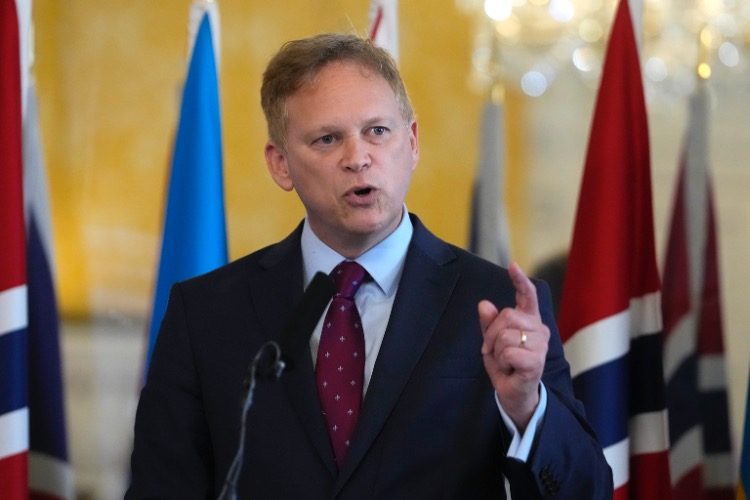
The U.K. and her allies are entering a “pre-war” era and could face conflict in “multiple theatres involving Russia, China, Iran and North Korea” within the next five years, warned U.K. Secretary of State for Defence Grant Shapps on Monday.
Speaking at Lancaster House in London, Shapps took the opportunity to acknowledge the changing geopolitics of the world while seeking increased government spending for defense, stating that “the era of the peace dividend is over.”
“We find ourselves at the dawn of this new era — the Berlin Wall a distant memory — and we’ve come full circle, moving from a post-war to pre-war world,” Shapps said.
The pre-war era is highlighted with “new nuclear, and soon to be nuclear, powers” joining Russia and China in making the world a more dangerous place.
Shapps declared North Korea is promising to “expand its own nuclear arsenal. And then there is Iran, whose enriched uranium is up to 83.7%, a level at which there is no civilian application. Back in the days of the Cold War there remained a sense that we were dealing with rational actors. But these new powers are far more unstable, and irrational. Can we really assume the strategy of Mutually Assured Destruction that stopped wars in the past will stop them in future, when applied to the Iranian Revolutionary Guard or North Korea?”
Shapps continued building his case for the “pre-war” era by citing the “spectre of terrorism and threats from non-state actors,” such as attacks by Hamas on Israel and the current threats to navigation in the Red Sea.
Noting the changes in warfare, Shapps acknowledged that “not only do our adversaries have the intent to target us, but they have a widening array of weapons with which to wreak havoc.”
He mentioned the growing threat of adversaries using cyber warfare to hack into networks and watch “economic carnage unfold.” “We know significant numbers of these attacks come from Russia and China where they are also developing satellite killing technology, capable of degrading us from space,” Shapps said. “Even mass migration can be cynically used against us as a weapon of war, as Poland, Norway, and Finland have been experiencing. In other words, nation states plus non-state actors with greater connections between them plus more creative weapons all adds up to more trouble for the world.”
Shapps then cited recent actions taken by the U.K. to prepare for the growing threats to the country and her allies. He listed the U.K.’s support for Ukraine, adding that this year Britian is leading the largest NATO deployment since the end of the Cold War. He also mentioned the signing of a Global Combat Air Partnership with Japan and Italy, along with the creation of the Australia-U.K.-U.S. enhanced security partnership.
Shapps claimed the new defense partnerships “are about sharpening our strategic edge so we can maintain our advantage over our adversaries. They are precisely the deep relationships needed to preserve national and regional security. And they’re emblematic of the way we will work in future.”
Emphasizing the need to be prepared and to increase spending to defend the U.K. in the pre-war era, Shapps admitted, “Today, for the very first time this government is spending more than £50bn a year on Defence in cash terms, more than ever before,” adding, “and we have made the critical decision to set out our aspiration to reach 2.5% of GDP spent on defence.”
NATO’s Military Committee chair, Dutch Admiral Rob Bauer, speaking on Wednesday at the opening of a two-day national defense chiefs meeting in Brussels, echoed Shapps’ concern over the world entering a new pre-war era.
According to Reuters, Bauer suggested that NATO, since Russia’s invasion of Ukraine in 2022, “should adjust their thinking to ‘an era in which anything can happen at any time, an era in which we need to expect the unexpected, an era in which we need to focus on effectiveness in order to be fully effective.’”
Shapps shared that the world is experiencing the highest number of violent conflicts since the Second World War.
He closed his appeal stating, “We stand at this crossroads — whether to surrender to a sea of troubles, or do everything we can to deter the danger. I believe that, in reality, it’s no choice at all. To guarantee our freedoms, we must be prepared. Prepared to deter — the enemies who are gathering all around us. Lead our allies in whatever conflicts are to come. Defend our nation whatever threat should arise. This is what Britain has always done.”




